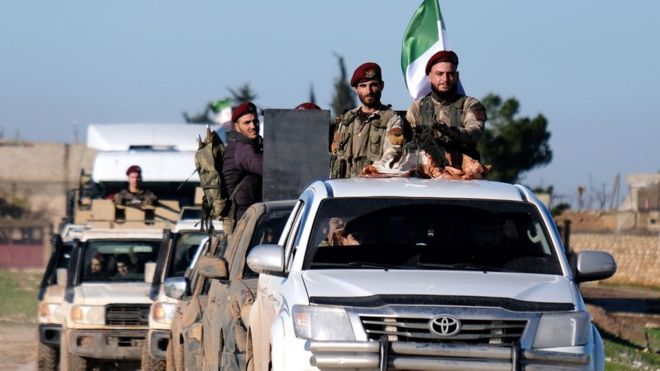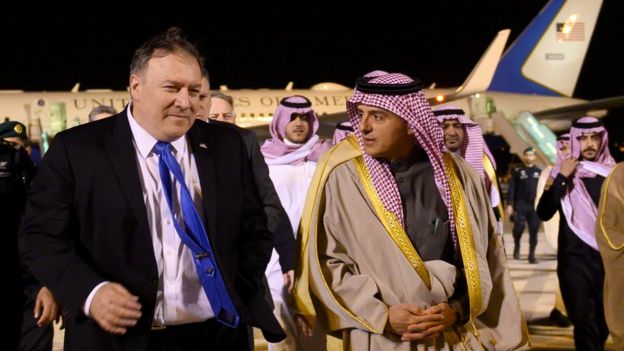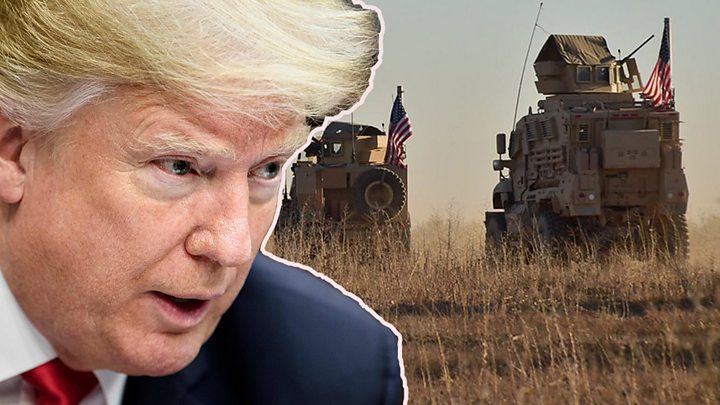Trump threatens to 'devastate' Turkish economy over Syrian Kurds
Related Topics
Image copyrightEPA
Image captionTurkish-backed forces are poised to launch an offensive against Kurdish fighters in northern Syria
US President Donald Trump has threatened to "devastate Turkey economically" if it attacks Kurdish forces in Syria following a planned pullout of US troops.
In two tweets on Sunday, Mr Trump said that he didn't want the Kurds to provoke Turkey either.
US forces have fought alongside a Kurdish militia in northern Syria against the Islamic State (IS) group.
Turkey, however, regards the People's Protection Units (YPG) as terrorists.
President Recep Tayyip Erdogan has spoken angrily about American support for the group and vowed to crush it.
Mr Trump's comments on Sunday followed further criticism of his abrupt decision to withdraw US forces from Syria.
A senior figure in Saudi Arabia's royal family,
Prince Turki al-Faisal, told the BBC it would have a "negative impact" that would benefit Iran, Russia and Syria's President Bashar al-Assad.
US Secretary of State Mike Pompeo is currently in the Saudi capital Riyadh as he tours the Middle East to reassure US allies in the region.
What did Mr Trump say?
The president defended his decision to withdraw troops, saying any remaining IS fighters could be attacked from an unspecified "existing nearby base".
He did not say how Turkey's economy would suffer if it attacked the YPG. Mr Trump also mentioned the creation of a "20-mile safe zone", which the BBC's Barbara Plett Usher says hints at the kind of solution Mr Pompeo is trying to negotiate.
Skip Twitter post by @realDonaldTrump
End of Twitter post by @realDonaldTrump
The president also said that Russia, Iran and Syria had been the biggest beneficiaries of US action in Syria and it was time to bring American soldiers home.
Skip Twitter post 2 by @realDonaldTrump
End of Twitter post 2 by @realDonaldTrump
President Erdogan's spokesman Ibrahim Kalin responded in a tweet, saying Turkey expected the US to "honour our strategic partnership".
"Terrorists can't be your partners and allies," he said.
President Trump shocked allies and faced strong criticism at home last month when he ordered US forces to immediately begin withdrawing from the approximately 30% of Syria controlled by the YPG-led Syrian Democratic Forces (SDF) alliance.
What has Mike Pompeo said?
Over the weekend, Mr Pompeo said he had spoken to Turkish Foreign Minister Mevlut Cavusoglu by phone and was "optimistic" that an agreement could be reached with Turkey to protect Kurdish fighters. He did not give details.
Speaking in Abu Dhabi, Mr Pompeo said the US recognised "the Turkish people's right and Mr Erdogan's right to defend their country from terrorists".
"We also know that those fighting alongside us for all this time deserve to be protected as well," he added.
Image copyrightREUTERS
Image captionMike Pompeo is on a politically sensitive visit to the Middle East
In Riyadh, the secretary of state is expected to discuss Iran and the conflicts in Yemen and Syria, US media report, as well as seeking an update on the investigation into the murder of journalist Jamal Khashoggi.
Mr Khashoggi, a critic of Saudi Arabia's rulers, was murdered at the Saudi consulate in Istanbul three months ago.
How many US troops are in Syria?
About 2,000 US military personnel are reported to be deployed in northern Syria.
Ground troops first arrived in autumn 2015 when then-President Barack Obama sent in a small number of special forces to train and advise YPG fighters.
Media captionWas Trump right to say IS is beaten?
The US did this after several attempts at training and arming Syrian Arab rebel groups to battle IS militants descended into chaos.
Over the intervening years the number of US troops in Syria has increased, and a network of bases and airfields has been established in an arc across the north-eastern part of the country
lol???

 Despite all the upheaval and madness, in broad strokes itll be back to business as usual. The regime in solid control, while sheltering PKK as a trump card against Turkey.
Despite all the upheaval and madness, in broad strokes itll be back to business as usual. The regime in solid control, while sheltering PKK as a trump card against Turkey.






